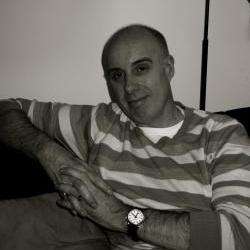Introduced by Southbank Centre’s artistic director, Jude Kelly, this latest instalment of The Rest is Noise festival felt like one of those events that rarely finds its way into the concert diary. A packed hall witnessed one of those feats of sheer physical, intellectual and emotional energy that you are unlikely to forget. With the 76-year-old Philip Glass leading his ensemble on keyboard, his three-and-a-half-hour piece Music in Twelve Parts passed in a flash of obsessive brilliance.
Not that this type of minimalist concert would always have filled a large concert hall in the past. In the early 1970s, this work – and those by Steve Reich – were given a very wide birth by audiences and the musical establishment alike. Despite its clear links to popular music, the repetitive, accumulative nature of Music in Twelve Parts would have infuriated most listeners and only a small cult following was established. For the musical elite at the height of the avant-garde, when the “barriers” of rhythm, melody and harmony were being challenged and broken down, the detailed analysis of all these elements by Glass et al was seen as a conservative and retrogressive step. It wasn’t to be until much later that their contribution to the musical landscape of the 20th century was taken seriously at all. But after 40 years when composers have been trying to find new ways to reconnect to audiences after the free-for-all of experimentation, it is possible to see Music in Twelve Parts by Philip Glass for what it is: a superhuman achievement of complexity and subtlety on a level with any work by arch avant-gardist Pierre Boulez.
And this is a work that certainly cries out to be heard live. The tension created by the performance itself, with players stretched to the very limits of stamina and concentration, is palpable in the hall. Despite its long stretches of dance-like rhythmic patterns, this is not background music, but it demands to be heard and appreciated for the intricacies of its musical arguments. What was special about this performance by the seven musicians was a sense that this performance linked to the original performances in 1974, with three of the performers having been part of that original group, including the composer himself. After 40 years, the performance felt as vigorous and perky as any of the recorded versions.
It’s very hard to pick out any particular passages in the piece or performances that stood out for criticism or praise. This is a true ensemble piece with no real opportunities for individuals to shine. From the outset, there was a sense of a journey that stretched everyone to the limit, and in this performance there was a particular, resolute sense of unity and style. Truly heroic, though, was the sustained musicality and even tone of the soprano Lisa Bielawa, particularly during the first three movements when her repetitive part was placed particularly awkwardly in the middle of her range. The three keyboard players kept the rhythmic impetus alive and in the rare passages where the tempo fluctuates, as in the sixth movement, Glass managed these awkward passages effortlessly. The woodwind soloists uncannily disappeared into the mix, at times emerging to imitate the human voice. The whole performance was clearly mixed by Dan Bora and Dan Dryden, responding to the performers’ requests for adjustments to the levels as the performance progressed.
Throughout there was an overwhelming sense that at the core of this group of musicians was a deep understanding of each other and of the music. It was indeed a superhuman demonstration of unselfish cooperation, very much in tune with pre-punk world of peace and love of the early 1970s. At the end of the five-hour evening one was left feeling elated, relieved at having survived it, and expanded by a rare and extraordinary experience.


